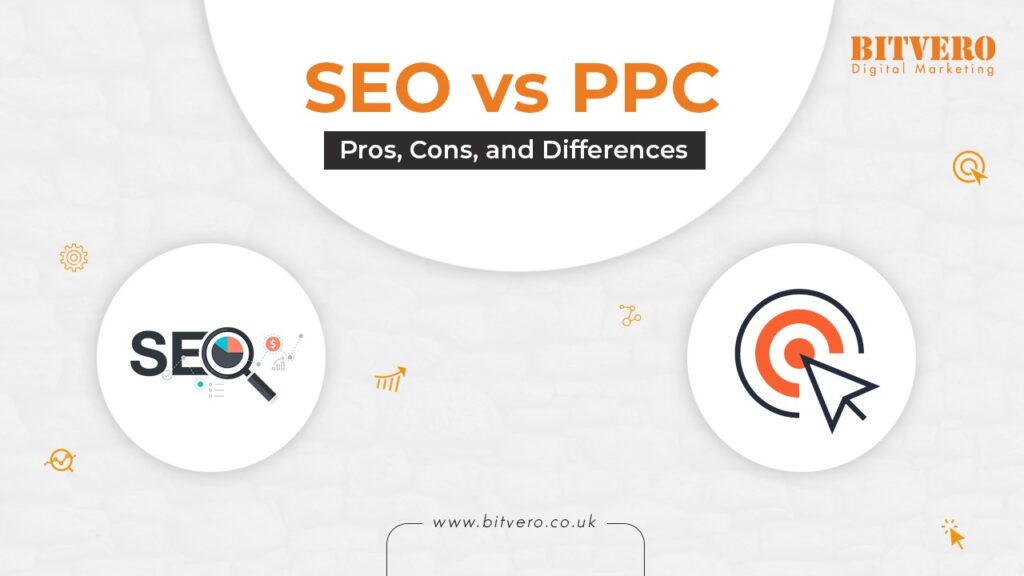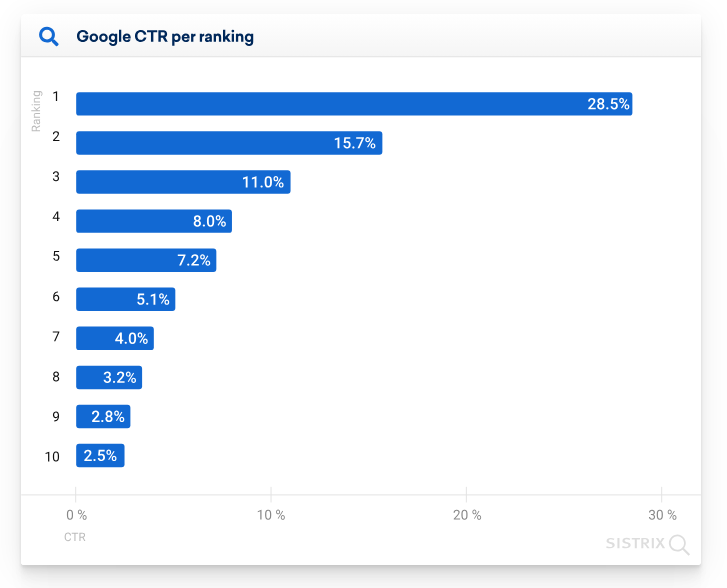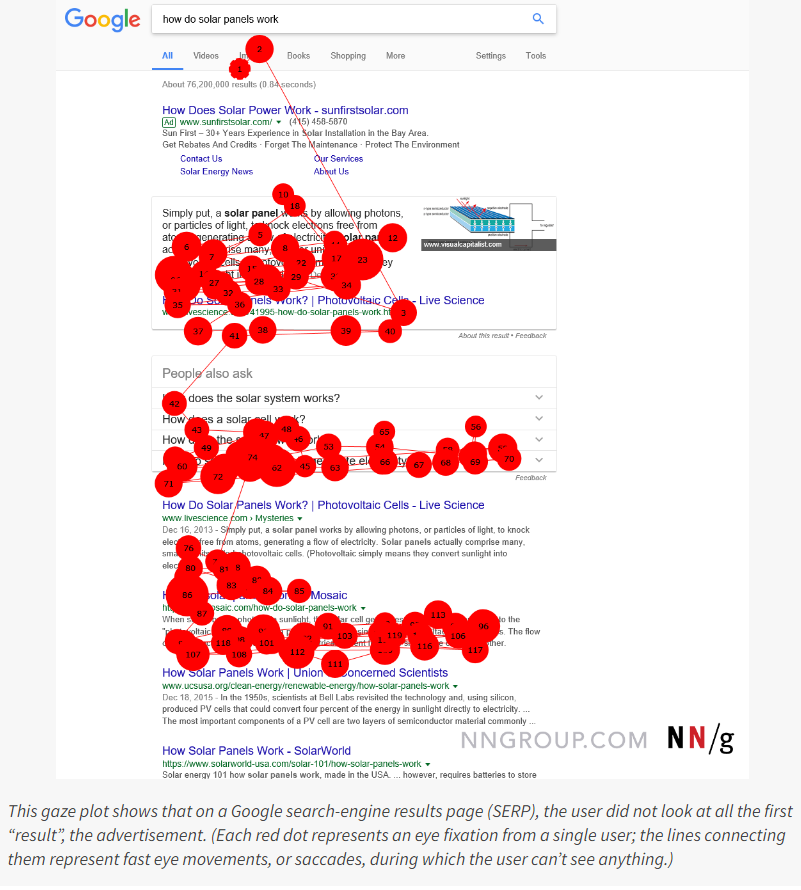SEO vs. PPC: Pros, Cons, and Differences

SEO and PPC, both being sub-parts of a broad digital marketing strategy, have different intents and outcomes.
Both have advantages for you, but that depends on your goals, requirements, and also on budget.
On the other, they also have some disadvantages that appear quite obvious when you place both strategies in contradictions.
In this scenario, comparing the set of pros and cons of two strategies and concluding which one yields best as per your needs becomes important.
So here, in this article, we will take a closer look at the advantages and disadvantages of SEO and PPC.
Seeing that, you will be able to easily decide which one should be your priority when promoting your brand in the online space.
SEO: Pros
It yields long-term results
SEO gives long-term benefits. That means if somehow you manage to make a keyword rank high in search engines, they usually can retain this position for a long period.
Also, a page that you have not updated for a long may still capably attract viewers, yielding you long-term benefits.
It does not cost you money
The best thing about search engine optimisation is that it is almost free to conduct. Your precious time, efforts, research, observations, and the ability to improve are key ingredients that make SEO a cost-effective digital marketing strategy for you.
That means, unlike spending money on ads, in SEO, you just rely on optimising the website through quality content, effective structure, backlinks, meta tags, page speed and certainly more things to become visible in SERPs.
It helps you build trust and credibility
People tend to trust organic results more than those coming in the form of Google-paid ads. In this scenario, the more times you appear in search results, the more people trust your brand.
In fact, CTR for organic results remains quite higher than for sponsored ads.
The average CTR for Google’s first and second organic results are 28.5% and 15.7%, respectively.

The average click-through rate on Google Ads paid search ads is 4-6%
Read Also: SEO Cost: What Should I Pay?
SEO: Cons
With all the discussed advantages, SEO also has some drawbacks. Let’s get to know about them one by one.
SEO is time-consuming
SEO not only yields long-term results but also takes long-term efforts. That’s because SEO is a gradual process, meaning any action you make takes time to show results. Even if you want to implement the most relevant keyword, improving your rankings may take weeks or even months.
So, to achieve success in SEO, you will require much patience that businesses who desperately want ROI do not show.
Algorithms keep changing
One notable drawback of SEO is that search engines continuously change their algorithms, which may negatively affect hard-earned rankings.
These updates usually impact rankings when SEO best practices are neglected or, to be more precise, manipulated.
But still, in some rare cases, search engines end up penalising websites that follow ethical SEO practices.
One example includes Google’s mobile-friendly update, which negatively impacted many websites because they were only optimised for desktop versions.
Results remain uncertain
Another drawback of SEO is that it will pay you for efforts is not certain. No matter how dedicatedly you work to climb to the top of SERPs, if your competitor exceeds your efforts, it may not remain on par with them or, in a worse case, may go in vain. Besides competition, sudden changes in algorithm or content relevancy are some other factors that contribute to uncertainty in SEO results.
PPC: Pros
Let’s get to know how Google PPC ads benefit your business.
It delivers immediate results
Google PPC ads always remain the best option for businesses that want quick ROI. Whether you are eager to bring traffic to your website or it is about to get quick leads or conversions, Google PPC do not make you wait long to appear in search engines.
Once you have set up a Google ad campaign, the final step is making them live to appear in search results.
You have control over positioning
With PPC, you have control over where you want to become visible, i.e., any desired country, region or location.
If you find any specific area, compared to others, has more potential customers or you’re offering, or the service is more likely designed or available for any specific location, you can easily target specific keywords based on demographics and other features to show your ads there.
You pay for clicks only
Google PPC charges you only when someone clicks on your ad. This remains the best and most notable benefit of Google PPC. Because, unlike traditional ad types, you do not need to pay for just placing the ad in front of users, regardless of whether they pass through it without showing interest in it; this becomes a cost-benefit that also gives you control over the ad budget.
PPC: Cons
The cost remains quite high
The major drawback of Google PPC ads is that they are quite expensive, especially for businesses with low budgets or initial growth stages.
It goes even higher when you want to target highly competitive keywords.
Because so many advertisers are ready to pay more for that, the bid on that goes higher and higher.
However, you can somewhat lower CPC with effective optimisation of copies and landing pages with a good quality score, the right bidding strategy, and proper management.
Ad Blindness becomes a barrier
People usually favour organic search results and tend to ignore ads or even intentionally avoid clicking on them. This tendency of not paying attention to ads is called ad blindness or banner blindness.
This nature remains there on the whole web, including blog ads and even Google ads in SERPS.
According to an eye-tracking study by Nielsen Norman Group, it was observed that some users have learned to skip past the ad presented at the top of the Google search results, even though its visual design is far from the traditional banner ad.

The learning curve can’t be neglected
To manage PPC campaigns, a good understanding of the platform is very important.
In fact, not only platform knowledge but also the overall optimisation task and strategies require some sort of expertise in Google PPC management.
From finding the right keywords with thorough research to creating effective ad copies and using CTA in the right place, neglecting the learning curve can make PPC ads a disadvantageous marketing strategy.
Want Digital Help?
If you are looking for a digital marketing company in London to handle your overall online strategy, including Google PPC, SEO and social media marketing, Bitvero is happy to assist you.
You can reach out to our office or give us a call on 020 374 52786

